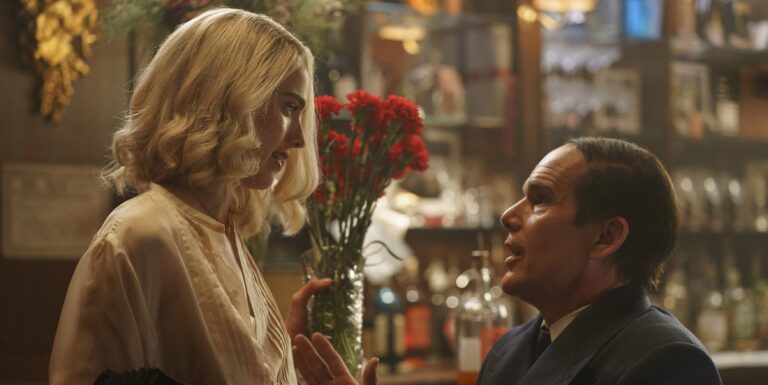With a history of collaboration spanning some three decades, Richard Linklater and Ethan Hawke have long been a powerful pairing, and their partnership yields some of its finest results in Blue Moon, premiering today at the 75th annual Berlinale. Set almost entirely inside the legendary Sardi’s bar on March 31, 1943 — the night Oklahoma! premiered on Broadway to rave reviews — this lean, sharply written piece offers a snapshot of a man watching his relevance slip away in real time.
Lorenz Hart (Hawke), the brilliant but self-destructive lyricist behind classics like “My Funny Valentine,” “The Lady is a Tramp,” and “Blue Moon,” finds himself adrift as his longtime partner Richard Rodgers (Andrew Scott) moves on to collaborate with Oscar Hammerstein (Simon Delaney). The era of Rodgers & Hart is over, and in its place, Rodgers & Hammerstein are pioneering a new kind of musical, one that embraces sincerity and big, broad emotions. As someone who thrives on wordplay and wit, Hart sees this shift as a betrayal of everything he holds dear. And so, he drinks. And talks. And drinks some more.
The tragedy of Blue Moon is not just that Hart knows he’s a relic, but that he can’t do anything to change it. His barbed remarks about Oklahoma!’s fake sincerity aren’t just cynical jabs, they’re desperate attempts to assert his own relevance in the face of mounting evidence to the contrary. When he eagerly (and a bit desperately) tries to pitch Rodgers a new idea for a sardonic, satirical musical based on the adventures of Marco Polo, Rodgers deftly deflects, noting that audiences want something different now, something more hopeful. Hart recognizes the truth in that statement, even if he can’t bring himself to voice it aloud; the bitterness in his laughter and the way his shoulders slump when the conversation moves on says it all.
With the exception of its opening few minutes, Blue Moon never leaves Sardi’s, unfolding with the measured pace of a stage play — an approach that suits its subject matter perfectly. Hart slings barbs at the industry, at the earnestness of Oklahoma! and the culture that’s embracing it, and sometimes at himself. He trades quips with the bartender (a pitch perfect Bobby Cannavale, whose affection for Hart never wavers, no matter how much bullshit he spouts) and waxes philosophical with a columnist who would go on to become a celebrated children’s author. He muses about art, commerce, and his own crumbling legacy, all while nursing an ill-advised fixation on Elizabeth Weiland (Margaret Qualley), a 20-year old Yale fine arts student (Hart is 47).
Hawke, ever a master of his craft, captures Hart’s sharp humor and bruised ego in equal measure, turning him into both the life of the party and its saddest spectacle. He’s a man who knows he’s on the way out, but he can’t quite bring himself to leave. His energy fills every corner of the frame, whether he’s delivering an exquisitely cutting insult or quietly crumbling under the weight of his own self-loathing. Qualley, in far less screen time, makes a striking impression as Elizabeth, lighting up the room during her first appearance and then vanishing for most for most of the evening, only to reappear for arguably the film’s best scene, a lengthy conversation in the bar’s cloakroom, full of longing and self-delusion in equal measure.
Elizabeth represents everything Hart no longer is: young, idealistic, full of possibility. He talks endlessly of his affection for her, but there’s a quiet understanding beneath it all: he knows a romantic entanglement is off the table, despite his musings to the bartender and the young pianist in the corner. When Elizabeth gently lets him down, it barely registers as a moment of heartbreak, because he clearly expected it. The real heartbreak is that it doesn’t change anything for him; he’ll still sit at this bar, nursing his drink, trying to talk the past back into existence.
Blue Moon wrestles with questions of artistic integrity versus commercial appeal, and of watching the world move on without you. Hart’s disdain for Oklahoma! is rooted not just in artistic preference, but in a fear that his own era, one of jazz-inflected show tunes and cutting wordplay, is being replaced by something simpler, broader, and (in his eyes) lesser. The film doesn’t take sides in this debate, instead letting Rodgers make a compelling case for the power of accessibility in art. There’s no villain to be found here, just two men who once created magic together and now find themselves on opposite sides of a cultural shift. The script (penned by Robert Kaplow, who also has a bit of shared history with Linklater) does little to make Hart likable, but it does make him rather fascinating. And in the hands of an actor like Hawke, even the character’s most acidic moments feel deeply human.
Find more of our Berlinale 2025 coverage at this link.

